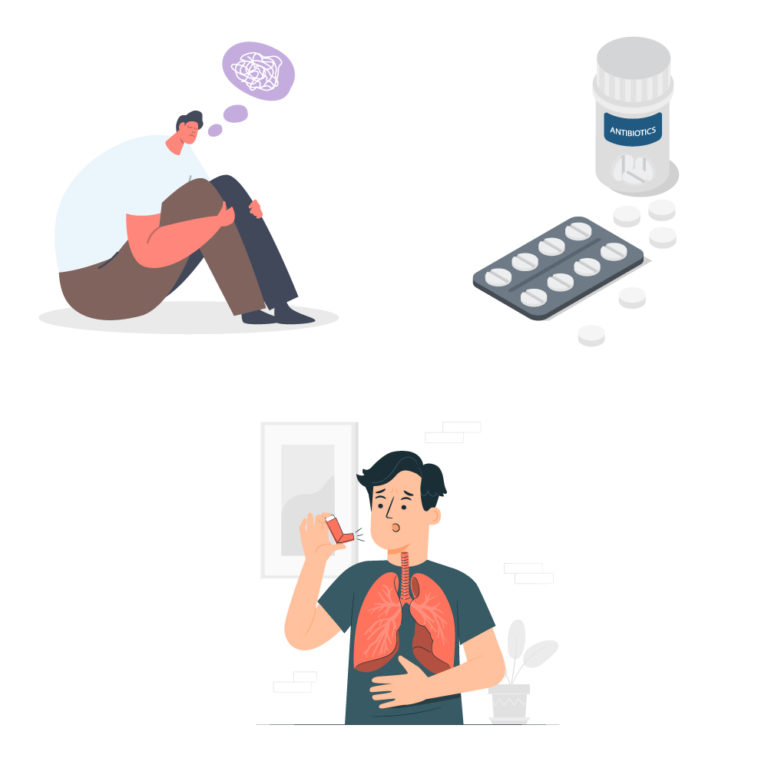Antibiotics are medicines that doctors give to people when they have infections. Infections happen when tiny living things called bacteria get inside our body and make us sick. Antibiotics help by killing these bacteria or stopping them from growing. This way, antibiotics help our body to fight the infection and get better.
But sometimes, medicines like antibiotics can have side effects. Side effects are things that happen in your body that you don’t want when you take medicine. One side effect that some people notice when they take antibiotics is insomnia. Insomnia means trouble sleeping. It means you find it hard to fall asleep or stay asleep during the night.

In this article, we will learn about:
- What antibiotics are and how they work
- What insomnia is and why good sleep is important
- Which antibiotics can cause insomnia
- Why antibiotics might cause insomnia
- What to do if antibiotics cause trouble sleeping
- How to sleep better when you are taking antibiotics
- When to talk to your doctor about sleep problems
Let’s start!
What Are Antibiotics?
Antibiotics are special medicines that help your body fight infections caused by bacteria. Bacteria are tiny living things that are all around us. Some bacteria are good for us, like the ones that live in our stomach and help us digest food. But some bacteria can make us sick.
When bacteria get inside your body and cause problems like sore throat, ear infection, or pneumonia, the doctor may give you antibiotics. Antibiotics kill the bad bacteria or stop them from growing. They do not work for viruses, which cause colds or flu.
There are many types of antibiotics. Some common ones you may hear about are:
- Amoxicillin
- Ciprofloxacin
- Doxycycline
- Erythromycin
- Azithromycin
Each type works a little differently, but they all help fight bacterial infections.
What Is Insomnia?
Insomnia means having trouble sleeping. When you have insomnia, you may:
- Find it hard to fall asleep at night
- Wake up many times during the night
- Wake up too early and not be able to sleep again
- Feel tired and sleepy during the day because you didn’t get enough rest
Sleep is very important for your body and brain. When you sleep, your body rests and heals. Your brain also works to keep your memory sharp and your mood good. If you don’t sleep well for many nights, you can feel cranky, tired, and find it hard to concentrate in school or work.
Antibiotics That Can Cause Insomnia
Not all antibiotics cause insomnia, but some types are known to affect sleep in some people. The side effect of insomnia from antibiotics is not very common, but it can happen.
Here are some antibiotics that may cause trouble sleeping:
1. Fluoroquinolones
This group of antibiotics includes medicines like ciprofloxacin and levofloxacin. They are used to treat serious infections like urinary tract infections or lung infections. Sometimes, these antibiotics can cause side effects that affect the brain and nerves. People taking fluoroquinolones have reported problems like feeling restless, nervousness, and trouble sleeping.
2. Macrolides
Macrolides include antibiotics like erythromycin and azithromycin. These are often used for respiratory infections like bronchitis.
Some people may feel restless or have trouble sleeping when they take these medicines.
3. Tetracyclines
Examples are doxycycline and minocycline. These are used for acne and some infections.
Some users have reported feeling restless or having trouble sleeping when taking tetracyclines.
Why Do Antibiotics Cause Insomnia?
Scientists are still studying exactly why some antibiotics cause insomnia. But here are some possible reasons:
1. Effect on Brain Chemicals
Some antibiotics may affect chemicals in the brain called neurotransmitters. These chemicals help control sleep and wakefulness. When antibiotics change the balance of these chemicals, it can make it harder to fall asleep or stay asleep.
2. Feeling Restless or Nervous
Antibiotics like fluoroquinolones may cause feelings of restlessness or anxiety. When you feel restless or nervous, your body stays awake and alert, making sleep difficult.
3. Side Effects Like Stomach Upset or Pain
Sometimes, antibiotics cause stomach pain, nausea, or discomfort. When your stomach hurts, it is hard to relax and fall asleep.
4. Interaction with Other Medicines
If you are taking other medicines along with antibiotics, these medicines can interact and cause sleep problems.
What To Do If You Have Trouble Sleeping Because of Antibiotics
If you start having trouble sleeping after you begin taking antibiotics, here are some simple things you can do:
1. Tell Your Doctor or Pharmacist
Always tell your doctor or the person giving you medicine if you find it hard to sleep. They may decide to change your medicine or suggest ways to help you sleep better.
2. Take Antibiotics Early in the Day
If possible, take your antibiotic medicine earlier in the day, not right before bedtime. This may help reduce trouble sleeping.
3. Create a Good Sleep Routine
Try to go to bed and wake up at the same time every day. Make your bedroom quiet, dark, and cool.
4. Avoid Caffeine and Sugary Drinks
Caffeine (found in coffee, tea, cola) can make it harder to sleep. Try not to drink these in the afternoon or evening.
5. Relax Before Bed
Do calming things before sleep, like reading a book or listening to soft music. Avoid screens like TV or phone before bed.
6. Avoid Naps During the Day
If you have trouble sleeping at night, try not to take long naps during the day.
When to See the Doctor About Insomnia and Antibiotics
If your sleep problems continue for more than a few days, or you feel very tired during the day, tell your doctor. Also, if you notice other problems like feeling very anxious, confused, or having strange thoughts, you should seek medical help quickly. Never stop taking your antibiotics without asking your doctor. Stopping medicine early can cause the infection to come back or get worse.
- Antibiotics help fight bacterial infections.
- Insomnia means trouble sleeping.
- Some antibiotics like fluoroquinolones, macrolides, and tetracyclines can cause insomnia as a side effect.
- Antibiotics may affect brain chemicals or cause restlessness, making sleep difficult.
- If you have insomnia when taking antibiotics, tell your doctor.
- Try to take medicine earlier, keep a good sleep routine, and avoid caffeine.
- Don’t stop medicine without doctor advice.
- See your doctor if sleep problems get worse or last a long time.
Medicine is very important to keep us healthy, but sometimes it can make us feel uncomfortable. Knowing the side effects like insomnia helps us understand our body better and take care of ourselves while we get better. Always listen to your doctor and take medicines as they tell you. Good sleep is a key part of feeling well, so try to rest well and get healthy!







